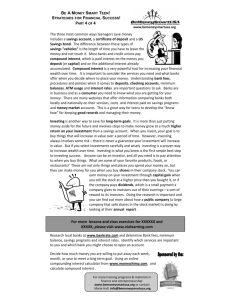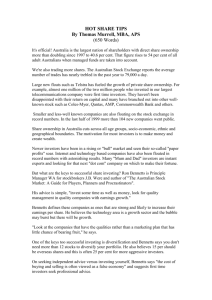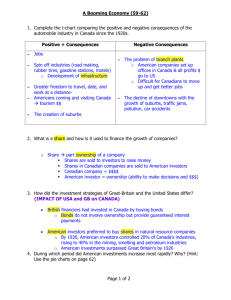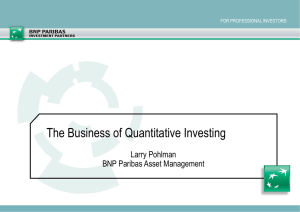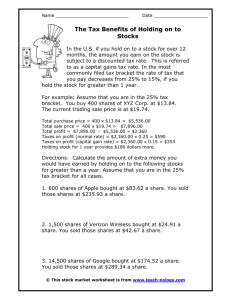the presentation
advertisement
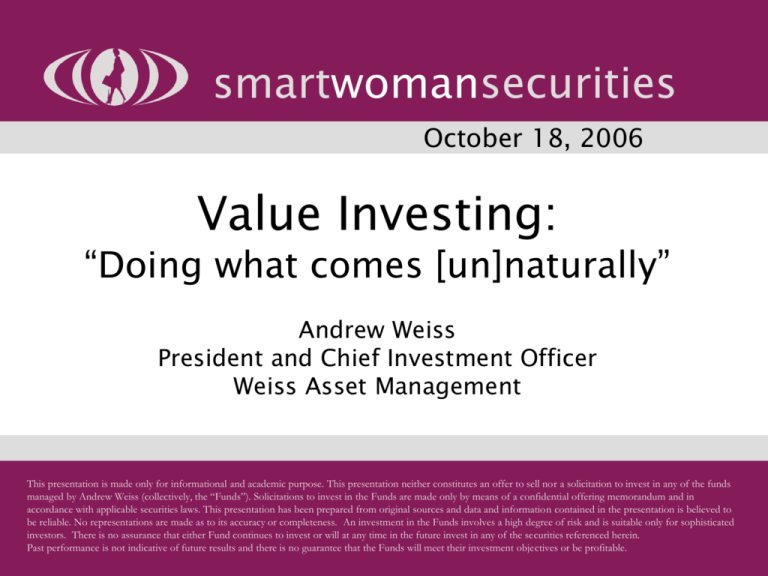
smartwomansecurities October 18, 2006 Value Investing: “Doing what comes [un]naturally” Andrew Weiss President and Chief Investment Officer Weiss Asset Management This presentation is made only for informational and academic purpose. This presentation neither constitutes an offer to sell nor a solicitation to invest in any of the funds managed by Andrew Weiss (collectively, the “Funds”). Solicitations to invest in the Funds are made only by means of a confidential offering memorandum and in accordance with applicable securities laws. This presentation has been prepared from original sources and data and information contained in the presentation is believed to be reliable. No representations are made as to its accuracy or completeness. An investment in the Funds involves a high degree of risk and is suitable only for sophisticated investors. There is no assurance that either Fund continues to invest or will at any time in the future invest in any of the securities referenced herein. 1 Past performance is not indicative of future results and there is no guarantee that the Funds will meet their investment objectives or be profitable. Rules for Daily Life vs. Logic Driven Analysis Rules for Daily Life •Avoid empty restaurants. •Network externalities: Some products are more valuable if your friends also own them. VS Logic Driven Analysis •In stock market, popularity is fully reflected in price. •“Buying what your friends own” doesn’t increase risk adjusted returns. Familiar names may be riskier. 2 Rules for Daily Life vs. Logic Driven Analysis Rules for Daily Living •Gut instinct useful for many decisions; e.g. detecting aggressive intentions. •Evidence: Damage to prefrontal cortex hurts decision process. VS Logic Driven Analysis •Market price already reflects gut instincts of others. •I use my gut instinct to find places to search for contrarian opportunities 3 Rules for Daily Life vs. Logic Driven Analysis Rules for Daily Living •“Believe in yourself.” •Optimists are popular. •Project self confidence. VS Logic Driven Analysis •Know your limits. •Doubt yourself. •When you buy or sell the other side may know something you don’t know. “In the fight between you and the world, back the world.” – Kafka 4 Rules for Daily Life vs. Logic Driven Analysis Rules for Daily Living •Join consensus. •Ridicule idiosyncratic views. •Pass litmus tests for “soundness”. •Choose stocks your friends like. VS Logic Driven Analysis •Choose portfolio to maximize risk adjusted returns. •Don’t get embarrassed by owning junk. •A poor-performing company can be a profitable investment. 5 Rules for Daily Life vs. Logic Driven Analysis Rules for Daily Living •Relationships matter for success. •Group loyalty – shared beliefs (tribalism). •Emotional and psychological supports. VS Logic Driven Analysis •Markets are anonymous. •Paying more for “We listen to you!” is an expensive form of psychotherapy. 6 Aren’t you on the team?! 7 Value Investing Is Psychologically Difficult Uncertainty Aversion •Avoid political, legal, or other “unquantifiable risks”. •Buy solid companies VS Risk Aversion •For any security there is a price which will increase your risk adjusted returns. •Idiosyncratic risk is good. 8 Value Investing Is Psychologically Difficult Slogans VS Logic Driven Analysis • Use “stop-loss” orders. •“Bygones are bygones”. • “Take profits”. •“Ignore what you paid”. • “Paper” gains or loses are not real. 9 Value Investing Is Irreligious Slogans •The “market” punishes greed. •“Bulls make money, bears make money, pigs lose money”. VS Logic •The market is not a Pagan god. •The market doesn’t care about what you paid. 10 Value Investing Is Psychologically Difficult Predisposition •“Sell decision is harder than buy decision”. VS Logic Driven Analysis •Buy and sell decisions are almost identical. •Every investment is a contest with cash. 11 Disciplined Analysis is Emotionally Stressful Predispositions •Need explanations for events that affect us. •Anthropomorphize the market: “The Market is consolidating gains!” •“Don’t fight the tape!” VS Market Discipline •Don’t try to predict short term price movements. •Accept your ignorance. •Don’t watch your stocks. 12 “All human errors are impatience, a premature breaking off of methodical procedure…” -Kafka Evolutionary Success •“Don’t just stand there, do something”. •Fight or flight. VS Investment Success •Wait. Think. •“Don’t just do something, stand there”. 13 “If, after the first twenty minutes, you don't know who the sucker at the table is, it's you.” ~Author Unknown Evolutionary Success •Alpha types succeed. •“Lead, follow or get out of the way” VS Rational Skepticism •You can’t “motivate” markets. •Watch out for winner’s curse. •Why is the other side selling to you? •What do you know that others don’t? 14 Our Evolutionary Legacy Learning Patterns •The physical world follows predictable cycles: seasons, tides, animal migrations, monsoons. •Evolutionary success can depend on learning these patterns. VS Inventing Patterns •Our brains see patterns in random data – coin flips. •Even if price patterns were real, they will change as people learn them and make trades based on historic patterns. 15 Our Evolutionary Legacy Pre-literate Analysis VS •Imitate successful actions. •Learn from personal experience, stories, legends. There is no other available data. Quantitative Analysis •Use data. •Databases contain thousands of experiences that are accurately recalled, and can be analyzed. 16 Our Evolutionary Legacy Our Evolutionary Legacy VS •Expertise is known within small tribe. •Past success is a good predictor of future success: Follow the person who found the last water hole. Rational Skepticism •Chance can create “experts”. •Past 1-3 year returns have poor predictive power. •Anyone who could predict short run price movements would trade options – make billions 17 Our Evolutionary Legacy Pre-numeracy rules of thumb •Separate mental accounts to ease computation costs. •Prune decision tree. •Ignore some possibilities. •Remaining possibilities are overweighted. VS Quantitative Analysis •Mathematics can perform complicated computations. •Gauge portfolio risk, not individual risks. •Gains from diversification. •Compute conditional probabilities. •Avoid assigning zero probability to unlikely events. 18 Russia: high risk, long term investment • In 1996, entire Russian stock market was valued at less than Home Depot. • Funds had fixed expiration dates, some owned domestic shares of Gasprom which were priced at fraction of ADRs. 19 Kazakhstan: moderate risk, long term investment • Price of Kazakhstan Fd. crashed after Russia crisis. • Bought KIF for less than cash. • Cancelled shareholder obligation to put up more money –returned cash; cost basis near zero. • Sold assets cut expenses and returned more cash. • Remaining asset: $13 million of cash • Possible lawsuit against previous investment manager • We own 68% of the shares. 20 Vietnam: moderate risk, long term investment • Bought Beta Vietnam Fund for less than cash and less than 30% of our valuation of the net worth. • Gained majority control, replaced management, distributed cash, sold assets. 21 China B Shares: moderate risk, short/medium term investment. • China B shares were selling for less than ½ price of identical A shares. • Senior advisor said domestic investors should be allowed to buy the B shares. • China B share investment trust redeemable monthly, traded at discount to B shares, bought and redeemed repeatedly. • B and A share prices converged. 22 Taiwan Fund: low/moderate risk, short term investment • Redeemable index tracker fund, one week of market risk. • Shares priced at midpoint between today's and yesterdays close. • Brokers were given limited allocations. • Established relationships, bought $14 million at 2+% discount with one week of market risk – could hedge with future contract. 23 Thailand: moderate risk, medium term investment • Thai domestic funds with fixed wind-up dates, large annualized excess returns, illiquid. • Placed orders every day for roughly 30 funds at discounts generating 20+% excess returns. 24 Turkey: short/long arbitrage • Bought Turkey Growth Fund in Luxembourg at 17% discount, shorted Turkey Fund in U.S. at 75% premium. • Closed position when spread narrowed to 35%. 25 Macro-Economics and Fundamentals • 1993-4 Philippines trading at 16 times earnings with no electricity and barges with gas generators sitting in Manila harbor – first stock tip when I spoke to this class. • 1989-90 German re-unification, German stock market boomed, Germany fund traded at 50+% premium –short. 26 Macro-Economics and Fundamentals • 1993-4 Philippines trading at 16 times earnings with no electricity and barges with gas generators sitting in Manila harbor – first stock tip when I spoke to this class. • 1989-90 German re-unification, German stock market boomed, Germany fund traded at 50+% premium –short. 27 The Other Side Why Others Don’t Do What We Do 28 Why other investors don’t buy what we buy Weiss’s Decision Investor Response Buy Kazakhstan Investment Fund Turned off two large potential institutional investors: 29 Value Investing Can Hurt Weiss Decision Response By Peers Recommended Mexican Industrials in 1982 Financial Consequence Ridiculed by Hd of Price of Mexico Corp. Finance for Fund went up more major investment than 1000%. bank 30 Value Investing Can Hurt Weiss Decision Result Stay out of U.S. market Underperformed during bubble Nasdaq in late 1990s. 31 Hard to Attract Investors • Institutional Investors Rely on “Signals” Investors fear unfamiliar names – – – – Kazakhstan Investment Fund Beta Vietnam Fund Ukraine Fund ICP-SEMF Pakistan 32 Value Investing is “Hard Work” • • • • • Uncertainty about amount and entitlement to undistributed revenue: prospectus may conflict with Articles of Assoc. Option value: effectively zero preference shares have written a long dated call to the ordinary shares Value voting rights The board can reallocate expenses, change dividends, repay bank debt, change portfolio allocation. Positive spillovers from real value of splits being realized. Difficult to compute optimal hedge. 33 34 Choose Your Battles • Invest in under researched markets – avoid competing against Goldman Sachs. • Gain sufficient expertise and develop contacts with market participants so that competitors suffer seriously from winner’s curse. 35 Shareholder Activism • Do Well by Doing Good. • Replace Boards of Directors • Speak at conferences, write articles, give interviews. • Litigate when necessary – establishes reputation for fighting for investors. • Negotiate early liquidations 36 Results from Analytical Approach • No losing years for diversified funds since inception in 1992. • Alpha approximately 20% • Gross Return since reorganization in 2002: 52% in 2003, 42% in 2004. Market risk was fully hedged. 37 Q&A 38 39 Popular Market Stocks Returns Excess Profits 40
